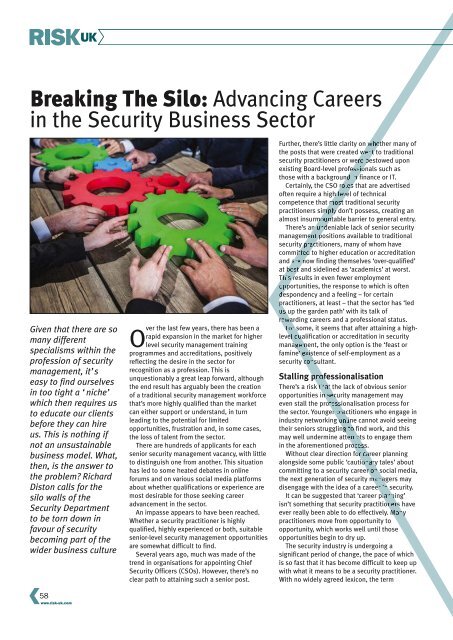RiskUKSeptember2017
Create successful ePaper yourself
Turn your PDF publications into a flip-book with our unique Google optimized e-Paper software.
Breaking The Silo: Advancing Careers<br />
in the Security Business Sector<br />
Given that there are so<br />
many different<br />
specialisms within the<br />
profession of security<br />
management, it’s<br />
easy to find ourselves<br />
in too tight a ‘niche’<br />
which then requires us<br />
to educate our clients<br />
before they can hire<br />
us. This is nothing if<br />
not an unsustainable<br />
business model. What,<br />
then, is the answer to<br />
the problem? Richard<br />
Diston calls for the<br />
silo walls of the<br />
Security Department<br />
to be torn down in<br />
favour of security<br />
becoming part of the<br />
wider business culture<br />
Over the last few years, there has been a<br />
rapid expansion in the market for higher<br />
level security management training<br />
programmes and accreditations, positively<br />
reflecting the desire in the sector for<br />
recognition as a profession. This is<br />
unquestionably a great leap forward, although<br />
the end result has arguably been the creation<br />
of a traditional security management workforce<br />
that’s more highly qualified than the market<br />
can either support or understand, in turn<br />
leading to the potential for limited<br />
opportunities, frustration and, in some cases,<br />
the loss of talent from the sector.<br />
There are hundreds of applicants for each<br />
senior security management vacancy, with little<br />
to distinguish one from another. This situation<br />
has led to some heated debates in online<br />
forums and on various social media platforms<br />
about whether qualifications or experience are<br />
most desirable for those seeking career<br />
advancement in the sector.<br />
An impasse appears to have been reached.<br />
Whether a security practitioner is highly<br />
qualified, highly experienced or both, suitable<br />
senior-level security management opportunities<br />
are somewhat difficult to find.<br />
Several years ago, much was made of the<br />
trend in organisations for appointing Chief<br />
Security Officers (CSOs). However, there’s no<br />
clear path to attaining such a senior post.<br />
Further, there’s little clarity on whether many of<br />
the posts that were created went to traditional<br />
security practitioners or were bestowed upon<br />
existing Board-level professionals such as<br />
those with a background in finance or IT.<br />
Certainly, the CSO roles that are advertised<br />
often require a high level of technical<br />
competence that most traditional security<br />
practitioners simply don’t possess, creating an<br />
almost insurmountable barrier to general entry.<br />
There’s an undeniable lack of senior security<br />
management positions available to traditional<br />
security practitioners, many of whom have<br />
committed to higher education or accreditation<br />
and are now finding themselves ‘over-qualified’<br />
at best and sidelined as ‘academics’ at worst.<br />
This results in even fewer employment<br />
opportunities, the response to which is often<br />
despondency and a feeling – for certain<br />
practitioners, at least – that the sector has ‘led<br />
us up the garden path’ with its talk of<br />
rewarding careers and a professional status.<br />
For some, it seems that after attaining a highlevel<br />
qualification or accreditation in security<br />
management, the only option is the ‘feast or<br />
famine’ existence of self-employment as a<br />
security consultant.<br />
Stalling professionalisation<br />
There’s a risk that the lack of obvious senior<br />
opportunities in security management may<br />
even stall the professionalisation process for<br />
the sector. Younger practitioners who engage in<br />
industry networking online cannot avoid seeing<br />
their seniors struggling to find work, and this<br />
may well undermine attempts to engage them<br />
in the aforementioned process.<br />
Without clear direction for career planning<br />
alongside some public ‘cautionary tales’ about<br />
committing to a security career on social media,<br />
the next generation of security managers may<br />
disengage with the idea of a career in security.<br />
It can be suggested that ‘career planning’<br />
isn’t something that security practitioners have<br />
ever really been able to do effectively. Many<br />
practitioners move from opportunity to<br />
opportunity, which works well until those<br />
opportunities begin to dry up.<br />
The security industry is undergoing a<br />
significant period of change, the pace of which<br />
is so fast that it has become difficult to keep up<br />
with what it means to be a security practitioner.<br />
With no widely agreed lexicon, the term<br />
58<br />
www.risk-uk.com

















